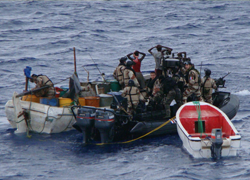Cross-posted at piracy-law.com
Most legal authorities assume that signing and ratifying the UN Convention on the Law of the Sea is insufficient, in and of itself, to provide a state a jurisdictional basis to prosecute acts of piracy on the high seas. For example, Jose Luis Jesus, the former President of the International Tribunal for the Law of the Sea has explained:
The international legal regime on piracy, as codified in articles 100 to 107 of UNCLOS, is, as already mentioned, a jurisdictional regime and, as such, only allows States to arrest pirates, seize their ships and cargo, and bring them to trial in the State’s domestic judicial system. This legal regime is not predicated on the existence of an international criminal substantive law, nor does it contemplate any international judicial means or structure to try pirates.
As it stands now, there is no international court or tribunal that includes in its jurisdiction a mandate to try pirates. Once a State asserts its jurisdiction over pirates and their ship by arresting them, under the international piracy regime, that State is encouraged to try the pirates and dispose of the pirate ship and its cargo in accordance with its own national legislation and judicial system. This means that if the arresting State does not have penal legislation allowing for the punishment of pirates, or if the arresting State does not want to try them in its own territory for political or other convenience, then the legal regime as codified in UNCLOS is of little use.
Similarly, the most recent UNSG report of 19 January 2012 on the problem of piracy in the Gulf of Guinea states that UNCLOS provides for universal jurisdiction to prosecute pirates, but since Benin’s Maritime Code does not incorporate these provisions, Benin’s jurisdiction on piracy acts committed on the high seas is limited to acts committed by its citizens or on board of Benin’s ships. The same concern has been expressed regarding the failure of the Transitional Federal Government to pass legislation criminalizing piracy in Somalia. Finally, based on UNCLOS Article 100 which requires that states must “cooperate to the fullest possible extent in the repression of piracy”, Douglas Guilfoyle has stated that “the inference is that States have no duty to enact relevant national offences [for piracy] and have ‘a certain latitude’ to cooperate in suppressing piracy by means other than prosecution.”

This view is understandable when observed through the lens of treaty law whereby implementing legislation is a necessary prerequisite to application within a municipal system. But the international law of piracy has also been accepted as customary law. For example, the 2010 Digest of US Practice in International Law, though noting the U.S. has not signed or ratified UNCLOS, states, “the actions and statements of the Executive Branch over more than six decades reflect the consistent U.S. view that this definition [of piracy in Article 101 of UNCLOS] is both reflective of customary international law and universally accepted by states.” Furthermore, each of the UN Security Council resolutions on piracy in Somalia and the Gulf of Guinea have emphasized that the only definition for the crime of piracy in international law is the one set forth in UNCLOS to which 162 states are states parties. UNCLOS has codified the customary international law of piracy.
Considering the law of piracy is settled both in treaty as well as customary law, is it possible that it is directly applicable in municipal systems without the need for implementing legislation? Some states accept that international law, especially with regard to jus cogens or very serious crimes (such as crimes against humanity and war crimes), applies directly within that state without the need to pass such legislation. With regard to piracy, whether or not it may apply directly would appear to hinge on a number of factors, including the gravity of the offence, whether there is a duty to prosecute in international law, whether the applicable treaties are self-executing, and the nature of a municipal system as monist or dualist. (Ward N. Ferdinandusse’s study is particularly helpful on this point.) Direct application of international law is not without precedent in African states, but will obviously need to be addressed on a case by case basis. To cite but one intriguing example, the 2010 Kenyan Constitution provides in Article 2 that the general rules of international law shall form part of the law of Kenya and that any treaty or convention ratified by Kenya shall form part of the law of Kenya under the Constitution.
The somewhat academic question of the indirect or direct application of international legal norms may not have been addressed by many African states confronted with piracy. Therefore, in the absence of clarity on this issue, the least risky practice would be to assume there is no direct application and insist on the codification of the legal definition of piracy in municipal law prior to instituting any prosecution. Indeed this seems to be the strategy adopted by the UN Security Council Resolutions on the issue. Is it, nonetheless, possible that the international law of piracy is directly applicable in certain African states, thereby rendering criminalization in positive law superfluous? The answer could have important ramifications for prosecutions in states without anti-piracy legislation or in those with incomplete legislative frameworks.


